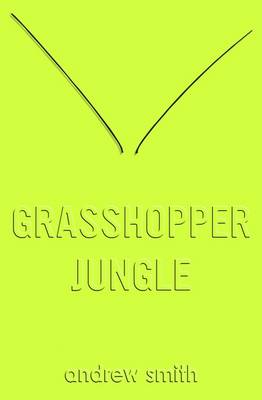Reviewed by Michael @ Knowledge Lost on
“History is full of decapitations, and Iowa is no exception.”
Grasshopper Jungle is told as the history of the end of the world from the perspective of Austin Szerba. Unlike a diary, Austin prefers to document the entire history, interweaving the story of the story of his Polish legacy with the ending of the world, feeling it is important to have an account of what happened in this small town. This young adult novel is a cheesy sci-fright survival story, full of outlandish monsters and comical situations.
The beauty of this novel doesn't come from the wacky plot it is with the protagonist himself. While the world is ending, Austin is struggling with his hormones and sexuality. At the heart of this novel is just a sixteen-year-old kid trying to make sense of his feelings; his hormones are always racing and everything under the sun seems to make him horny. Stuck in a small town mid-western where his Christian school had harsh words to him for reading The Chocolate War by Robert Cormier because it featured masturbating Catholics makes for an interesting backdrop. You have a situation where no one wants to talk about sexuality, but condemning masturbation and gay-bashing is perfectly acceptable.
“Stupid people should never read books.”
This is the type of book I like to read; it may have a bizarre plot happening but then it is also exploring an internal struggle. For Austin and most teenagers, their budding sexuality can be a confusing time; emotions are running wild and it is very easy to confuse on feeling for another. Robby has identified himself as a homosexual and it becomes clear in the novel that he has feeling for Austin. This makes it tricky; who does Austin talk to about his confusing feelings? He can't ask his best friend, his girlfriend, a teacher or most adults. There was an awkward and funny scene within the novel where he attempts to ask his father.
One of the biggest things I took away from this novel is to do with labels; Robby identifies as a homosexual but doesn't let that term define him. For obvious reasons he has to keep his sexual preferences a secret from the town but is out to the people he trusts. While Austin is struggling it has been suggested on a few occasions not to stop trying to define his sexuality and just be himself. This is a beautiful theme to have within this book and I would love to see the entire world take this on board. Obviously as a straight male, my sexuality was never a defining feature and I’m probably not the right person to be advocating this, but it is a great message.
“Do you think I'm queer, Rob?" I asked.
"I don't care if you're queer," Robby said. "Queer is just a word. Like orange. I know who you are. There's no one word for that.
I'm glad to have found a YA novel exploring such an important issue and I wish I knew of more like this. I feel like the majority of YA novels are not offering the help that a teenager might need. As an adult, it was interesting to see just how this book explored the topic of sexuality and continuously suggested to not let it define Austin. Sure, there is still a struggle and he is facing conflicting emotions; as a reader we watch him bumble along and make a fool of himself countless times, but this captures teenage life. I find myself being very impressed with Grasshopper Jungle, it is a fun and enjoyable read but at the heart of it, it has an important message.
This review originally appeared on my blog: http://literary-exploration.com/2014/08/09/grasshopper-jungle-by-andrew-smith/
Reading updates
- Started reading
- 23 June, 2014: Finished reading
- 23 June, 2014: Reviewed
